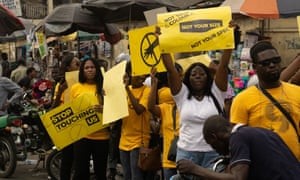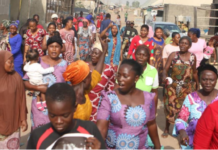Sexual harassment has long been rife in many work places, including markets. Now women are mobilising in protest. They are organising against the blatant lack of respect and care for women’s bodies. This may include obscene shouting, groping, stroking and grabbing. without consent.
It’s a common occurrence. In a poll in February 2019, The Guardian found that three quarters of those surveyed said they had experienced harassment during visits to markets. More generally, a recent study by the Ministry of Women’s Affairs found that nearly a third of young women had experienced violence by the age of 30. The study also reported that one in six women had experienced physical violence in the year before the survey.
In December last year, under the banner “market march”, women walked around Yaba to protest against harassment, groping and catcalling. They were armed with banners and megaphones and marched from Ojuelegba to Yaba—nearly two miles.
This first march was a small group, numbering about 20, but throughout the day tens of thousands of people sent their support. Organisers are now planning similar protests at markets across Nigeria.
Male stallholders, desperate to make sales, often touch and grope young women and girls. Attempts to brush them off usually attract lewd comments and insults.
Damilola Marcus launched Market March last year. She was inspired after hearing writer and designer Ozzy Etomi denouncing what she called “acceptable casual harassment” and talked about how, as a young girl, she was “dragged, catcalled and solicited by men in the market”.
“I think the stories hit me in a way that I couldn’t ignore any further,” says Marcus. “I felt like more could be done than just telling the stories. It’s normalised but it is not normal.”
Dressed in yellow T-shirts, the women, and some men, walked past the market holding placards and chanting: “Stop touching us”. More women and men joined the protest.
As they marched through the main road, some angry male traders hurled sachets of water and boiled corn at the protesters and threw out insults. Some traders actually blamed the women for dressing “inappropriately” and told them to stay at home if they want to avoid harassment.
Kenneth, a clothing seller, says things are changing. “People are more serious about touching now, and we now see that it is chasing our customers away, so we have to think about it.”
Although Lagos state criminal law classifies sexual harassment as a felony, and the market association can issue fines for any seller or trader who harasses women, implementation is weak.
An online petition (https://tinyurl.com/y637lysf) against harassment has already collected nearly 40,000 signatories. Organisers are planning to have similar protests in other markets across Nigeria.
“It is a very long fight and I know that we might have to march again”, said Marcus. A protest march through the Ogbete Market in Enugu was held in late March. Market March plans to take the protests to other markets. Two markets in Lagos will be visited later this year.
Similar action is needed in many work places to ensure everyone knows that sexual harassment is not acceptable. The Nigeria Labour Congress (NLC) organised its second march and symposium on gender-based violence and harassment at work at the end of March 2019.
by Tina NDI









